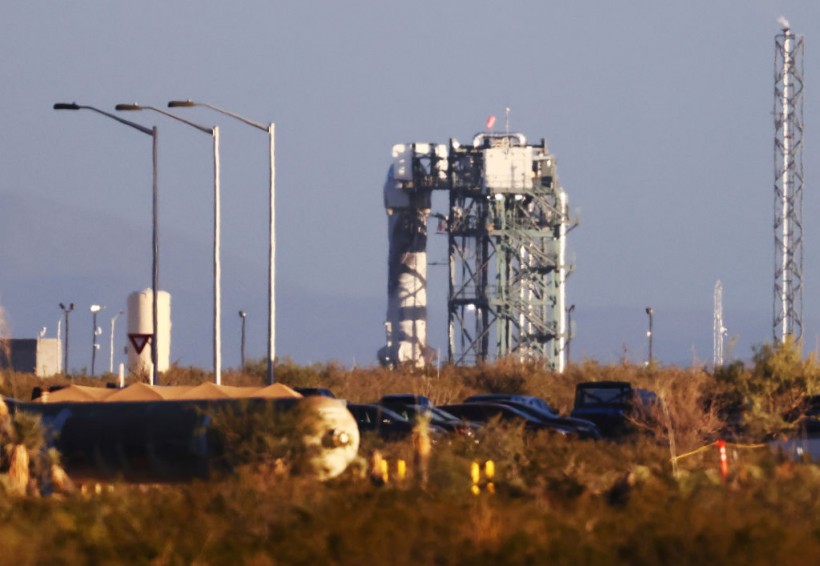Blue Origin, led by Jeff Bezos, plans to launch the New Shepard rocket for the first time in over a year. The company announced in social media posts that they are targeting a launch window on Monday, December 18. The mission follows a 15-month pause due to a mid-launch failure in September 2022.

Blue Origin’s New Shepard sits on the launch pad prior to lift off carrying 90-year-old Star Trek actor William Shatner and three other civilians on October 13, 2021 near Van Horn, Texas.
How To Watch New Shepard Rocket Launch Live
Blue Origin's New Shepard suborbital vehicle is set to launch from its West Texas facility today at 9:30 a.m. EST, with live coverage available on Blue Origin's platform from 9:10 a.m. EST.
Founded by Amazon's Jeff Bezos, Blue Origin plans an uncrewed mission, labeled NS-24, echoing the format of the September 2022 flight. The mission will carry 33 research payloads, over half supported by NASA, while others are contributions from K-12 schools, universities, and STEAM-focused organizations, emphasizing science, technology, engineering, art, and mathematics.
In line with Blue Origin's commitment to education, the flight will transport 38,000 postcards for Club for the Future, a nonprofit initiative by Blue Origin. The organization aims to inspire young minds and cultivate interest in space science and exploration.
This mission, marking the 24th overall liftoff for New Shepard, signifies Blue Origin's return to flight after a 15-month hiatus following a mid-launch failure in September 2022.
New Shepard's Launch Mishap 15 Months Ago
On their website, Blue Origin explains that the suborbital rocket system, New Shepard, is named after astronaut Alan Shepard, the first American in space. It aims to provide a transformative experience for astronauts and research payloads.
Moreover, the reusable rocket-capsule duo's mission is to venture beyond the Kármán line, marking the boundary of space, in an 11-minute flight that promises unparalleled perspectives.
Following its last flight on September 12, 2022, which encountered an anomaly during an uncrewed research mission, New Shepard has undergone meticulous investigation and corrective measures. The incident resulted in the loss of the first-stage booster, but the capsule landed safely, preserving all 36 research payloads.
The Federal Aviation Administration (FAA) identified the cause as a "thermo-structural failure" in the engine nozzle, attributed to elevated temperatures.
During that mission, the primary engine malfunctioned approximately one minute after liftoff, prompting the activation of the abort motor in the crew capsule. While the capsule, carrying payloads and devoid of occupants, safely descended with parachutes, the propulsion module experienced a crash.
The incident is attributed to the structural failure of an engine nozzle due to higher-than-expected engine operating temperatures. This aligns with Blue Origin's March findings, indicating that changes in the boundary layer cooling system design for the BE-3 PM engine caused increased nozzle temperatures, resulting in a "hot streak" at the fatigue location and ultimately leading to structural failure.
The FAA provided Blue Origin with 21 corrective actions, involving the redesign of engine and nozzle components and organizational enhancements. With these adjustments, Blue Origin is prepared to resume flights.
Having completed 31 successful journeys, New Shepard remains a pivotal player in suborbital space exploration, delivering astronauts and payloads to the edge of space and back.
RELATED ARTICLE: Blue Origin's New Shepard Rocket Experiences Propulsion Failure; Mid-Flight Mission Aborted
Check out more news and information on Blue Origin in Science Times.














